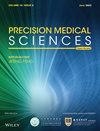The effect of nursing intervention guided by rehabilitation needs on the quality of postoperative self‐care agency and social relationships in esophageal cancer patients
IF 0.6
Q4 MEDICINE, RESEARCH & EXPERIMENTAL
引用次数: 3
Abstract
To explore the effect of rehabilitation‐oriented nursing intervention on self‐care ability and social relationship quality of patients with esophageal cancer after operation. 124 esophageal cancer patients from February 2019 to January 2020 were selected and divided into study group and control group. The control group was given routine nursing, and the study group was given rehabilitation‐oriented nursing intervention on the basis of the control group. The self‐care ability score (ESCA), social relationship quality score (SQRS), mood state score, hope level score (HHI), and nursing job satisfaction were statistically analyzed. Before intervention, there was no significant difference between two groups. After intervention, the scores of health knowledge, self‐concept, self‐responsibility, and self‐care skills were higher in the study group. The scores of friend relationship, family commitment, and family intimacy were significantly higher in the study group, also the SAS (Self‐Rating Anxiety Scale) and SDS (Self‐Rating Depression Scale) scores in the study group were lower than those in the control group, and the scores of attitudes to maintain close relationship with others, attitude to take positive action and attitude towards reality and future in the study group were higher than those in the control group. In addition, the satisfaction of nursing work in the study group was higher than that in the control group. The rehabilitation needs oriented nursing intervention for esophageal cancer patients can effectively regulate patients' depression and anxiety, improve their self‐care ability and hope level, improve the quality of social relations, and patients have high recognition of nursing work.以康复需求为导向的护理干预对食管癌患者术后自我护理能力及社会关系的影响
探讨康复护理干预对癌症患者术后自我护理能力和社会关系质量的影响。选取2019年2月至2020年1月癌症食管癌患者124例,分为研究组和对照组。对照组给予常规护理,研究组在对照组基础上给予康复护理干预。对自我护理能力评分(ESCA)、社会关系质量评分(SQRS)、情绪状态评分、希望水平评分(HHI)和护理工作满意度进行统计分析。在干预之前,两组之间没有显著差异。干预后,研究组的健康知识、自我概念、自我责任和自我护理技能得分较高。研究组的朋友关系、家庭承诺和家庭亲密度得分显著高于对照组,研究组的SAS(焦虑自评量表)和SDS(抑郁自评量量表)得分也低于对照组,与他人保持亲密关系的态度得分,研究组对积极行动的态度、对现实和未来的态度均高于对照组。此外,研究组对护理工作的满意度高于对照组。以康复需求为导向的癌症患者护理干预能有效调节患者的抑郁和焦虑情绪,提高患者的自我护理能力和希望水平,提高社会关系质量,患者对护理工作有较高的认可度。
本文章由计算机程序翻译,如有差异,请以英文原文为准。
求助全文
约1分钟内获得全文
求助全文

 求助内容:
求助内容: 应助结果提醒方式:
应助结果提醒方式:


